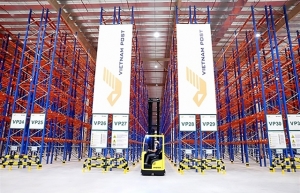Solutions required for competitiveness conundrum
 |
| Solutions required for competitiveness conundrum |
National Assembly (NA) Chairman Vuong Dinh Hue last week warned that the Vietnamese economy’s competitiveness is on the decline, with a number of growth impetuses waning.
“The economic growth rate in the first half of this year hit only 3.72 per cent on-year, making it very hard to reach the desired goal of 6.5 per cent this year. This would also mean our growth target for the 2021-2025 will be affected,” Hue said at last week’s Vietnam Socioeconomic Forum 2023 in Hanoi.
The NA earlier set a target that the economy will grow 6.5-7 per cent a year for 2021-2025.
“In the first eight months of this year, industrial production and construction have failed to become a key driving force for economic growth. This is risky for the economy as it is now changing towards a new growth model in which industrial production is considered an important pillar,” Hue said.
According to the General Statistics Office (GSO), Vietnam’s eight-month index for industrial production (IIP) suffered from an on-year drop of 0.4 per cent.
The eight-month IIP of 2023 for the processing and manufacturing, which creates more than 80 per cent of industrial growth, reduced 0.6 per cent compared to the same period last year when it went up by 10.1 per cent on-year.
“Our economy is facing massive difficulties, in which the resilience of enterprises is weakening as they almost have no markets for their products,” Hue said. “It is urgent now to help enterprises out of difficulties as soon as possible. Once they become stronger, the economy will be stronger.”
Jochen Schmittmann, resident representative of the International Monetary Fund (IMF) in Vietnam, said that like many other economies, Vietnam has been hit hard by global headwinds, which have dented the country’s economic growth in the first six months.
“Such headwinds have affected Vietnam’s exports and industrial production. However, I believe the economy will recover in the second half of the year thanks to global demands bouncing back and nations’ efforts dealing with issues related to finance and property,” Schmittmann said.
Prompted by economic difficulties, the IMF reduced its 2023 prediction for Vietnam’s growth from 6.2 per cent in January to 4.7 per cent in July.
“Nevertheless, Vietnam will still be affected by interruptions in global supply chains. The country will need more support for enterprises,” Schmittmann said.
According to the Ministry of Finance, in 2023, a package of about VND200 trillion ($8.44 billion) is earmarked for assisting enterprises in the form of tax exemption and reduction. So far, more than $5.48 billion has been released. Going forward, another $2.74 billion worth of budget revenue from last year will be added to the package, said Deputy Minister of Finance Vo Thanh Hung.
Tran Dinh Thien, former general director of the Vietnam Economics Institute said many enterprises have become exhausted due to a lack of capital and markets, while banks in general cannot provide them loans for a variety of reasons.
“If enterprises want loans, they must have collateral, but many are poor enterprises without valuable assets to mortgage at banks. This is a big paradox in the economy,” Thien said. “Often, even when enterprises are offered loans, they cannot boost production and business activities as there are no output markets for them. They cannot sell their products.”
So far this year to the end of August, 71,800 businesses halted operations, up 20.5 per cent compared to the corresponding period last year; 41,100 enterprises stopped operations and waited for dissolution procedures, up 26.7 per cent; and 11,800 enterprises completed such procedures, according to the GSO. On average, about 15,600 businesses were kicked from the market each month.
The Asian Development Bank has revised its growth forecast for Vietnam down from 6.5 to 5.8 per cent in 2023, and from 6.8 per cent to 6.2 per cent in 2024.
According to the Ministry of Planning and Investment (MPI), so as to promote growth, the government has been implementing many measures such as accelerating public investment disbursement, increasing exports, and stimulating consumption demand in a drastic, synchronous and effective manner.
“This is a very heavy task, because if growth fails to meet the target this year, it will affect the implementation of the Socioeconomic Development Plan for 2021-2025, the Socioeconomic Development Strategy for 2021-2025, and even further targets for 2030 - 2045 as proposed by the Resolution of the 13th National Party Congress,” said Deputy Minister of Planning and Investment Tran Quoc Phuong.
 | Smart logistics key for competitiveness improvement: experts To meet the demand of domestic trading and import-export activities, the logistics sector is working towards professional and competitive services meeting international standards, in which smart logistics development is considered the key solution. |
What the stars mean:
★ Poor ★ ★ Promising ★★★ Good ★★★★ Very good ★★★★★ Exceptional
Related Contents
Latest News
More News
- State corporations poised to drive 2026 growth (February 03, 2026 | 13:58)
- Why high-tech talent will define Vietnam’s growth (February 02, 2026 | 10:47)
- FMCG resilience amid varying storms (February 02, 2026 | 10:00)
- Customs reforms strengthen business confidence, support trade growth (February 01, 2026 | 08:20)
- Vietnam and US to launch sixth trade negotiation round (January 30, 2026 | 15:19)
- Digital publishing emerges as key growth driver in Vietnam (January 30, 2026 | 10:59)
- EVN signs key contract for Tri An hydropower expansion (January 30, 2026 | 10:57)
- Vietnam to lead trade growth in ASEAN (January 29, 2026 | 15:08)
- Carlsberg Vietnam delivers Lunar New Year support in central region (January 28, 2026 | 17:19)
- TikTok penalised $35,000 in Vietnam for consumer protection violations (January 28, 2026 | 17:15)

 Tag:
Tag:


















 Mobile Version
Mobile Version